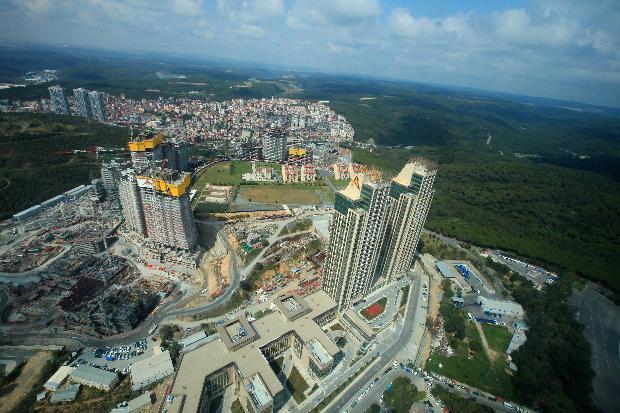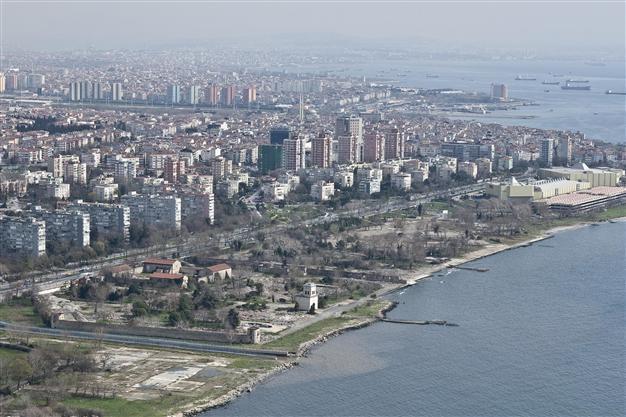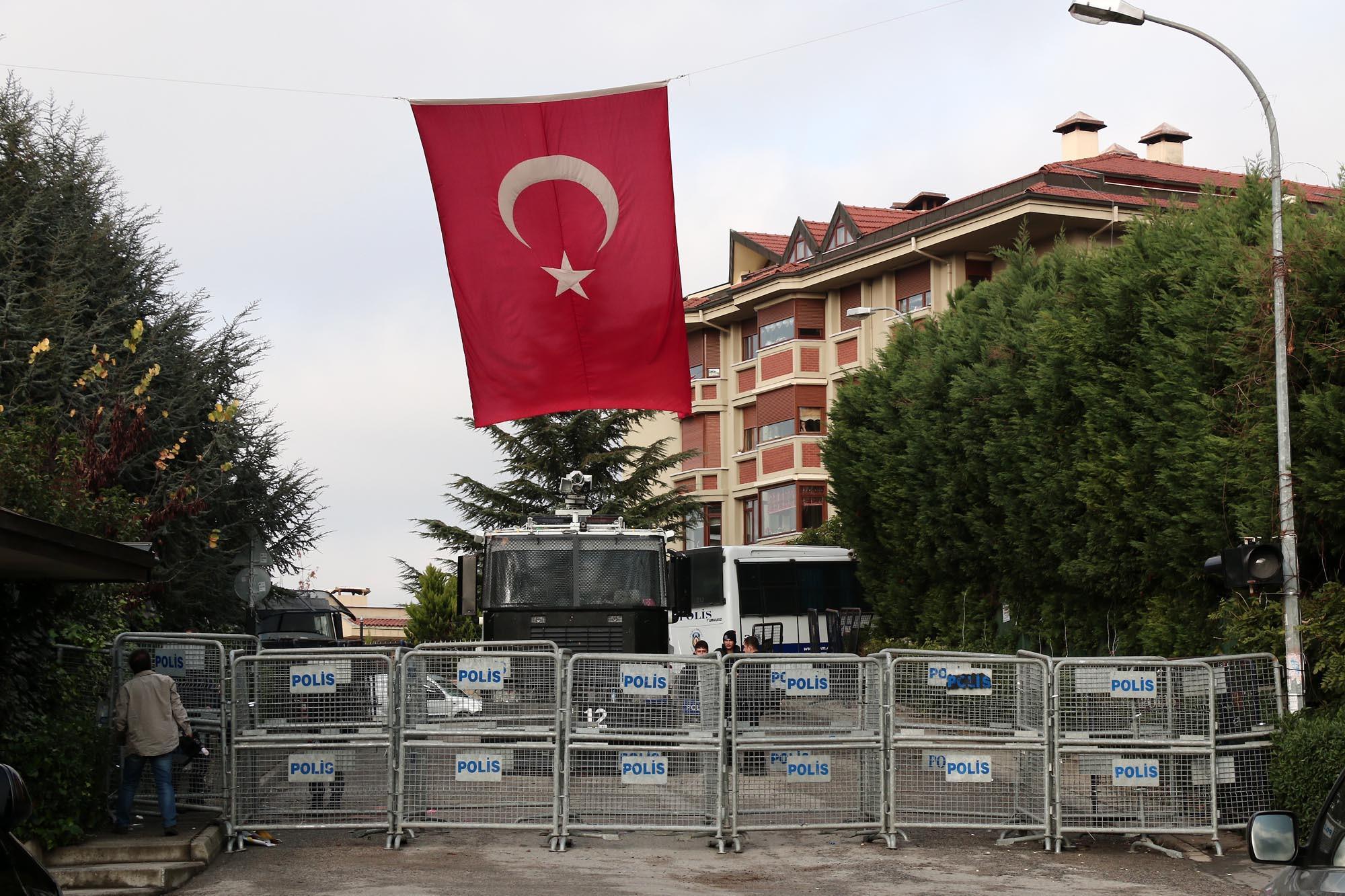Keep calm and carry on building: A guidebook for crooked contractors to trick the law in Turkey
Ömer Erbil ISTANBUL

Istanbul's third airport is one example of an ongoing mega-construction that is right on the limits of legality. At present, there are two different lawsuits opened by the Chamber of Environmental Engineers against the contracting of the airport construction, but there has been no development in the cases in the last two years. An eventual stay of execution order will be too late, and the construction may continue with minor changes in plans. AA Photo
If there is one rule in Turkey, it is the unwritten law that the building of more residential complexes, energy facilities, malls, bridges and tunnels that herald development and wealth – with the niggling side effects of the deterioration of nature and social cohesion, as well as workers’ deaths due to a lack of job safety – is paramount. Construction rules and, even more so, playing without rules!Many controversial construction projects have continued despite court orders for a stay of execution, thanks to cheap tricks – in all senses of the word – permitting contractors to bypass the law, often with the connivance of local administrations, if not the central government itself.
Both the Constitution and the Turkish Penal Code contain clear provisions sanctioning officials if they fail to implement the rulings of administrative courts.
However, from the mega-constructions of Istanbul’s third bridge and third airport, to the felling of trees in an olive plantation in the Aegean coal capital of Soma to pave the way for a power plant, companies have calmly adopted a number of easy methods to continue building.
Loopholes in the Turkish legislation and a lack of any dissuasive penalties offer investors and tycoons the necessary chutzpah to move on with their projects by hook or by crook, egged on by the government’s huge incentives for construction. Here are the main tricks used by companies:
1- Minor changes in master plans

Where? Urban transformation projects such as in the Istanbul neighborhoods of Sulukule and Ayvansaray, the Ağaoğlu construction company’s mega residential complex of “Maslak 1453” inside Istanbul’s Belgrade Forest, or the new presidential palace.
Pros and Cons: This method is a classic. It has been long been practiced with a high success rate, resulting in only small headaches for those choosing it. On the flipside, it may have to be repeated over an over again for long-term mega projects.
How? When a negative expert report is delivered to a court, companies usually hint that a suspension order is on its way. So they quickly make minor changes to the construction master plans that will not affect the project as a whole.
The project can still continue when an awaited stay of execution ruling is issued, because the lawsuit is launched on the initial master plan. Furthermore, it takes approximately two months for a court decision to be communicated to the parties. So it allows companies to gain the time needed to rush their project to a happy ending.
One of the latest, most typical examples, is the mega-residential project “Maslak 1453” (pictured above) of Ali Ağaoğlu, the larger-than-life contractor known for his close ties with the government. The project is being built within Belgrade Forest, the last remaining large green space close to the city on Istanbul’s European side. Due to the modifications, the company ended up reducing the number of total buildings from 4,789 to 4,681 – not a huge loss given the proportion of the outrage that the project has endangered. It certainly didn’t stop Ağaoğlu appearing on his trademark TV advertisements playing the role of a maverick “who gets things done” and as a construction guru, offering Istanbul residents the most ostentatious living arrangements.

2- Getting construction licenses for the initial master plan
Where? The contentious construction of the new Hyatt Regency on Istanbul’s European coast.
Pros and Cons: It is very simple and doesn’t need any additional effort. It is guaranteed not to lose investments in the event of modification, but it may not thwart a stay of execution order.
How? Companies have to make sure that the lawsuit will be launched on modified master plans. After this stage, no court decision can cancel the license if it is based on a version of the plan that is not under litigation.
Even though several constructions on a plot of land along the coast of the Marmara Sea on Istanbul’s European coast, including the new Hyatt Regency Hotel, have been stopped, the municipality was unable to cancel the licenses of construction companies. Indeed, the court was only able to reject a master plan modified in 2012, while the license dates back to a plan designed in 1997. The hotel was slated to be opened in August 2014, but construction will now be halted for an indefinite period.

3- Changing the numbers of parcels
Where? In the construction of a small-scale mosque in Istanbul’s Validebağ grove that has triggered huge local resistance.
Pros and Cons: A very innovative and efficient method, quickly implemented when necessary. But the complicity of the local municipality is imperative.
How? When a company grasps that the court may act according to the law and stop its construction, it can easily ask the municipality to change the number of parcels of land. As such, the court decision will relate to a space that won’t even exist where it is supposed to be, and the construction may continue peacefully and steadily.
This is how the construction of the small mosque next to the protected grove of Validebağ on Istanbul’s Asian side has continued despite the ruling of a stay of execution from an administrative court. The court’s ruling was on the 167th section, the 1,313th block and the 178th parcel. But, with the municipality’s help, the number of parcels was altered to 197, leading the Üsküdar District Municipality to argue that the mosque was built on land that remained outside the limits of the grove, where no construction is allowed due to its special status. Activists are still continuing to camp next to site, as they argue that the mosque will be the first step in the municipality’s plans to change the grove’s status so as to allow the construction of an entertainment complex.

4- Fait accompli, 'the rest is in God’s hands'
Where? At the olive plantations near the village of Yırca in Soma.
Pros and Cons: A brutal method of last resort with a lot of uncertainties, but it may work if the government lends a hand.
How? After a new law allowed the destruction of olive groves for the construction of energy facilities, the Kolin company – shockingly, it is also known to be close to the government – moved ahead to fell trees on a plantation in the Aegean coal capital of Soma, well-assisted by an urgent expropriation order approved by the Cabinet. However, locals swiftly responded by opening a lawsuit against the decision and starting an active movement to prevent the company from starting the construction too quickly.
When the imminent negative decision of the Council of State was leaked to Kolin, the company didn’t blink twice and organized night operations to cut thousands of trees, manhandling villagers guarding the plantation. As the grove was cleared of trees, everything was ready for the start of the construction of the plant. Unluckily for Kolin, the outrage was so strong that it had to announce that it would obey the court order for now.
But "the government is great" and, as the energy minister put it, "the sacrifice needed to cope with Turkey’s energy needs is greater." The plant in Soma was halted after huge public attention, but a number of hydroelectric plants (HES) construction projects or mining activities continue regardless of court orders. Residential complexes in Istanbul continue to spread like mushrooms under the cover of "urban transformation." The textbook of methods is still very useful for any contractor to bypass court decisions with the government’s acquiescence, giving priority to private investment over natural, social or cultural assets.
















